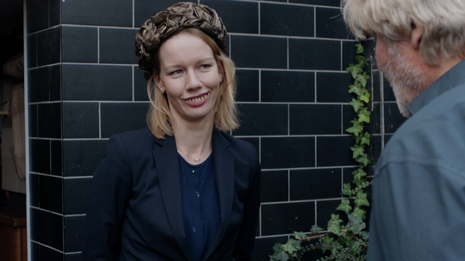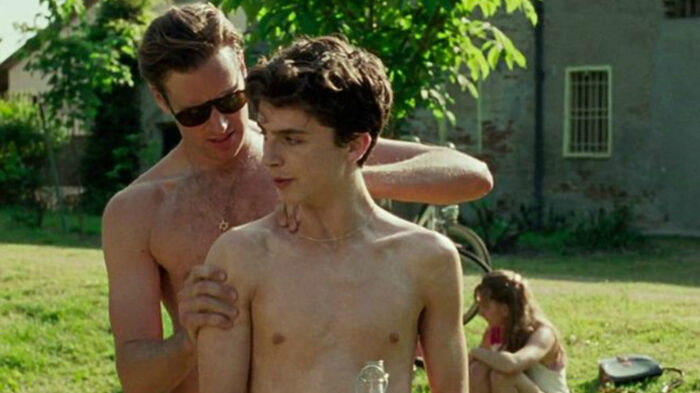Conflicted womanhood and embracing absurdity in Toni Erdmann
Madeleine Pulman-Jones turns to Maren Ade’s comedic masterpiece in her next column on cinema’s pioneering women

When asked about what it was like to premiere her film Toni Erdmann at Cannes in 2016, Maren Ade said that it was like her “own naked party”. She was referring to the surreal moment in the film in which the previously straight laced, cold business consultant Ines spontaneously decides to greet her birthday party guests in the nude, declaring that they cannot enter unless they too disrobe. However, the transformation from corporate to playful is neither so immediate nor so conclusive as this moment might suggest. Concerned that Ines has become too serious, her practical-joking father, Winfried, constructs the socially-awkward character of Toni Erdmann which he uses to surprise his daughter in all sorts of embarrassing ways at important meetings, functions and social gatherings. It is this persistent practical joking that encourages Ines’s emotional transformation.
It would be difficult to talk about German filmmaker Maren Ade without focusing on Toni Erdmann. Not only is the film her most ambitious to date, but it received nothing short of an ecstatic reception at international film festivals upon its release, with critics going as far as to regard it as a milestone in “German comedy”. Since graduating from the University of Television and Film in Munich, Ade has made three features: The Forest for the Trees (2003), Everyone Else (2009), and Toni Erdmann (2016). Having only made these three features, Toni Erdmann (which Ade wrote, directed and co-produced) exploded onto the scene with little context, leading its reception to be taken less as a piece in the body of work of an auteur, but rather a European cultural event.
“Maren Ade has proved herself to be a fearlessly unconventional storyteller, and certainly one to watch over the coming years”
Nevertheless, with Erdmann, Ade brought a fresh new perspective to European bourgeois comedy and was rewarded for her efforts by numerous European prizes such as the FIPRESCI Prize at Cannes. But what pushes Ade’s efforts beyond the typical bourgeois-political satire of the European art house, is its nuanced portrayal of Ines, at face value an objectively unlikable character. Ade’s understanding of Ines’s own personal struggle is what at times makes the viewer question whether they are watching a tragedy or a comedy. When one regards Ines’s personal setbacks and embarrassment with the gravity that Ade endows them, one finds oneself viewing her father’s ruthless practical jokes as more than merely slapstick.
Ade was perhaps inadvertently saying more about the universal experience of watching the film than just her own than she realised when she made the above comment. Watching Toni Erdmann is something akin to the feeling one gets dreaming about having to walk down a school hallway with no clothes on. Peter Simonischek’s Winfried/Toni is genius, full of comedic innovation and a paternal vulnerability that is rarely given space in mainstream cinema, and Sandra Hüller’s Ines plays something like a careful character study which was suddenly injected with thousand-watt electric shocks.
With Erdmann, Ade made a film that taps into the deeply human fear of disorder while still managing to make a touching film about fathers and daughters. What distinguishes the film from other oddball family reunion, corporate vs family stories such as Elf (dir. Jon Favreau, 2003), is that it meticulously portrays the struggle of a woman breaking under the pressure to conform in a male-dominated capitalist society.
At one point in the film, Ines declares to an arrogant male colleague that, in spite of her apparent ruthlessness, “I’m not a feminist – if I were I wouldn’t be able to put up with someone like you,” to which he replies, “I’ll take that as a compliment.” Even in her love life Ines is thus conflicted. Apparently having an affair with her colleague Gerald, in one scene Ines refuses sex with him and asks to watch him masturbate into a pastry which she then proceeds to eat. Under the gaze of another filmmaker, this might have been a subversive sex-scene to exemplify Ines’s cool control, but Ade pushes the viewer to think more deeply about Ines’s emotions and thought process when immediately after the act, she ostentatiously crosses her legs and calls a friend to inform her of a possible business development, completely ignoring Gerald.
Ines is real precisely because she inhabits the terrifying no-man’s-land of delusional ambition. She has had to fight so hard for what she wanted, however morally dubious that may be, that she has lost sight of her humanity. Ines’s experience of difficulty is expertly manifest in the incident that leads to the “naked party.” Preparing for the event, Ines finds herself struggling to move around in a clearly too-tight party dress. She runs to her room to take it off, but finds that she is unable to do so.
To make matters worse, while she is mid-struggle the doorbell begins to ring persistently, which leads her to give up entirely and answer the door naked – her complete and final submission to the absurdity of life of which her father has been attempting convince her over the past weeks. Perhaps this is specific to her experience as a woman in business, perhaps it is universal, but however simplistic and insensitive the ubiquitous interview question “do you think only a woman could have made this film?” may be, one wonders whether Ines’ subtle inner struggle would have been portrayed with such sensitivity as it is here had the film been directed by a man.
Aside from questions of gender representation, with Toni Erdmann Ade undoubtedly succeeded, as so few do, in the eternal cinematic challenge of creating a truly original image. Towards the end of the film, a gigantic fluffy creature with a column for a head and no face (Winfried in disguise) hugs a woman wearing a linen dressing gown with her hair in a business-like chignon. Even without the scene’s emotional context the image is striking. Maren Ade has proved herself to be a fearlessly unconventional storyteller, and certainly one to watch over the coming years
 News / Eight Cambridge researchers awarded €17m in ERC research grants27 December 2025
News / Eight Cambridge researchers awarded €17m in ERC research grants27 December 2025 News / Downing investigates ‘mysterious’ underground burial vault 29 December 2025
News / Downing investigates ‘mysterious’ underground burial vault 29 December 2025 Lifestyle / Ask Auntie Alice29 December 2025
Lifestyle / Ask Auntie Alice29 December 2025 Sport / Hard work, heartbreak and hope: international gymnast Maddie Marshall’s journey 29 December 2025
Sport / Hard work, heartbreak and hope: international gymnast Maddie Marshall’s journey 29 December 2025 Interviews / Meet Juan Michel, Cambridge’s multilingual musician29 December 2025
Interviews / Meet Juan Michel, Cambridge’s multilingual musician29 December 2025









